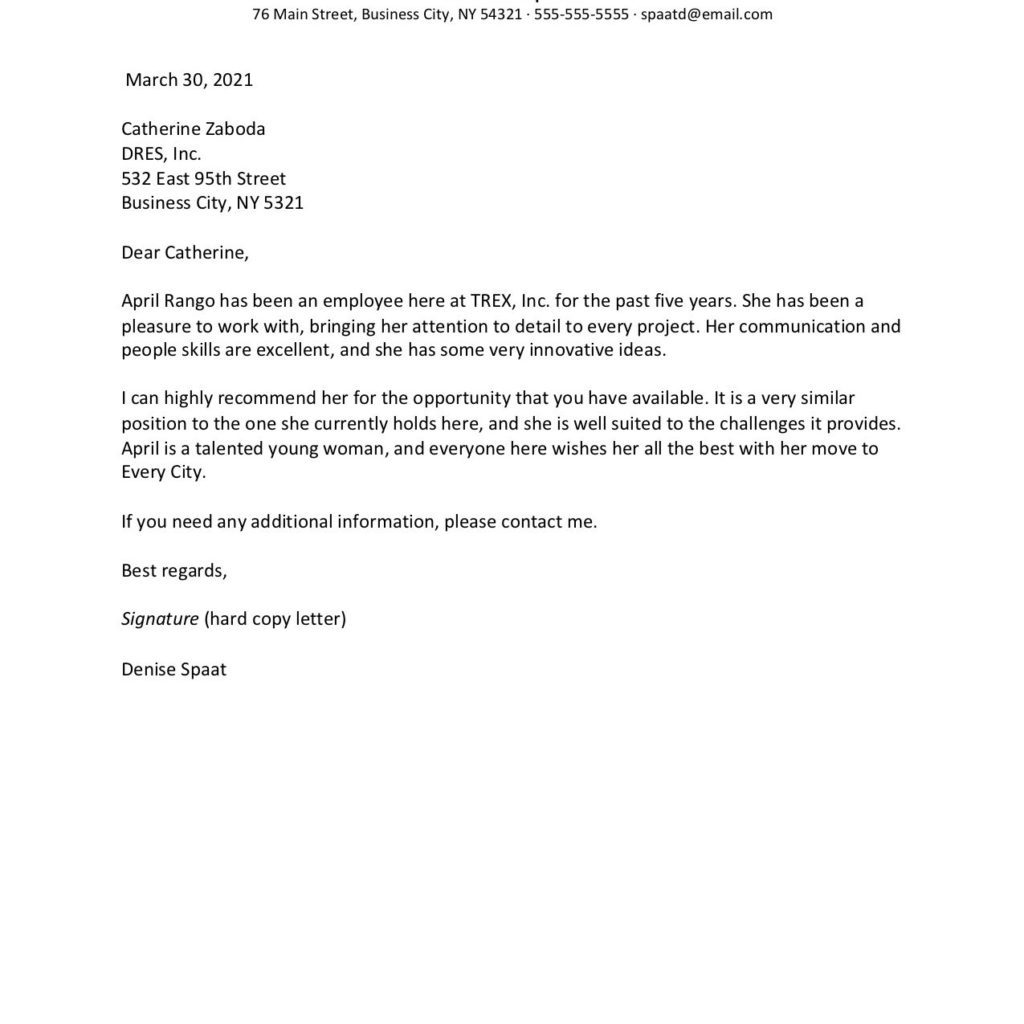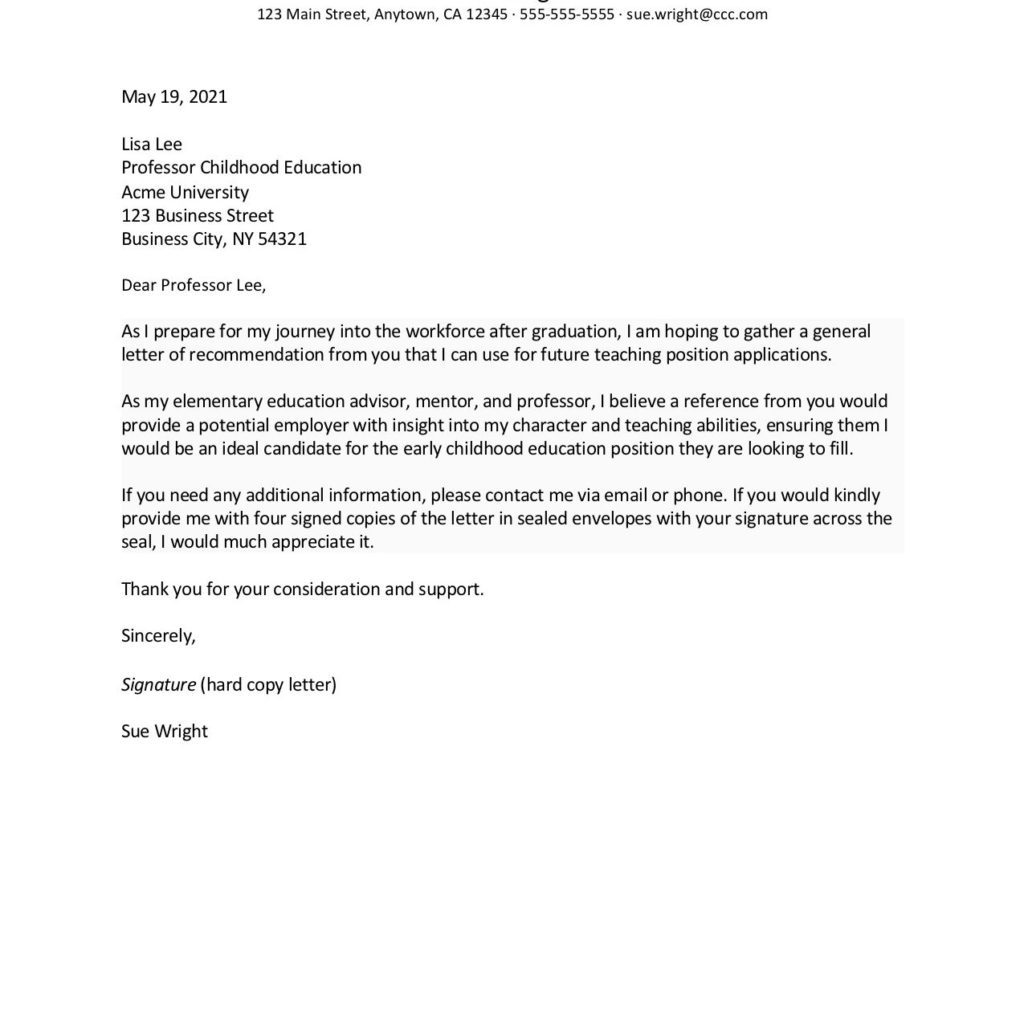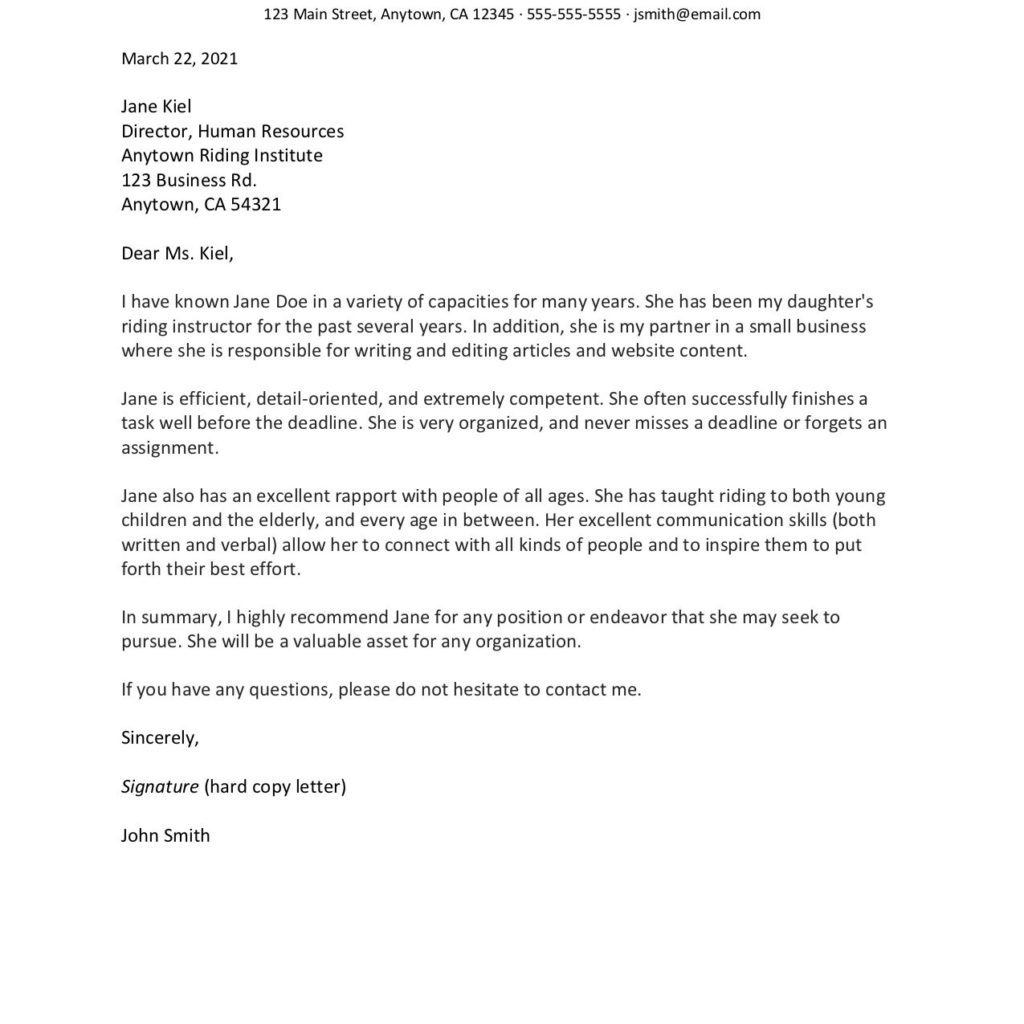Reference letter, or a recommendation letter is a document in which the writer assesses the qualities, characteristics, and skills of the person being recommended.
Specifically, the reference letter endorses that individual’s ability to perform a particular task or function.
Reference letter is typically related to an employment. When you apply for a job, it is sometimes expected of you to provide letters of recommendation to back up your application.
The company usually requires professional letters of reference, which describe your skills, competences, and work experiences relevant to the position you are applying.
Current or former supervisors, co-workers, customers, or other business professionals with first-hand knowledge of your capabilities may write these letters.
The person providing a reference is called a “Referee”.
There are other various reasons for needing a reference letter. For example, for an admission to a university or for certain specialised projects.
Some scholarship programs usually require their applicants to have a reference letter as well.
Before Writing a Reference Letter
What to Include in a Reference Letter
Types of Reference Letters
There are three most common types of reference letters.
Academic Reference Letter
Students commonly use academic references during the admissions process.
Most schools, both undergraduate and postgraduate, expect to receive at least one, preferably two or three, reference letters for each applicant throughout the admissions process.
Recommendation letters provide certain information to the admissions committees that previously, may or may not be already present in the college application.
Scholarship and fellowship programs typically request reference letters.
Teachers, guidance counselors, school officials, club organizers, and coaches have a lot of information and feedback on a student’s ability in their educational aptitude and attitude. They are usually the most suitable sources for writing academic references to indicate how a student would fit into the new university or career.
Letters written by academics for a non-educational institution, such as a company for employment, are usually for the applicant’s first job.
Professional Reference Letter
A professional reference describes your qualification, skills, and work ethic.
These are mainly used for job applications.
People who are looking for a new job rely heavily on letters of recommendation from their peers, ex-colleagues, ex-bosses, for employment and professional references.
The reference letters can be posted on a job website, attached to a CV or a résumé, or while filling out an application form. In some industries, the reference letters may even be included in a portfolio or given out during the job interviews.
Most employers require at least two professional references from job applicants.
As a result, having at least two recommendation letters on hand is a good idea for job seekers.
Employment reference letters typically include information from previous employment regarding the applicant’s job performance, work ethic, work style, and personal achievements, amongst others.
Former, or present employers, or a direct supervisor are usually the ones who have the capacity to write the letters.
Co-workers are also acceptable, but not as ideal as bosses, directors, or managers.
Job candidates who lack proper formal work experience to obtain recommendations from an employer or supervisor may turn to other sources such as community or volunteer organizations for being their referees.
Academic mentors are also another possibility, as they would have had close contact with the applicants and would have observed the applicant’s work abilities and/or potential to excel for their new workplace.
Character References
Character references or character recommendations are frequently use for housing accommodations, legal matters, child adoption, and other similar situations in which knowing a person’s character is critical.
Some people may require this type of letter of recommendation at some point in their lives.
Former employers, landlords, business companions, neighbours, doctors, and acquaintances are usually the ones who provide such reference letters.
However, the suitable person differs depending on the purpose of the letter of reference.
Before Writing a Reference Letter
There are some things you should remember before asking someone to write a reference letter for you.
It is never a good idea to wait until the last minute to seek a recommendation letter.
It is important to allow your referees enough time to write a useful letter that makes a good first impression.
We will recommend to begin looking for suitable academic references at least two months ahead of time.
Employment reference can be gathered during the course of your career.
Before you leave a job, politely request a recommendation from your boss or co-worker.
You should attempt to obtain a recommendation from each supervisor with whom you have worked with during the course of your career.
You should also collect reference letters from landlords, creditors, suppliers, or people you pay money to and people with whom you conduct business with. This enables you to have a pool of character references you can call upon, if you ever need one.
Requesting a Reference Letter

There are a few things you may want to take note to make the reference letter request process more efficient and professional.
Narrow Down Your Referees
First, think about the people in your network, who are best suited to give you a letter of recommendation.
Who you choose may be determined by the basis for your request for a referral.
For instance, managers or colleagues with experience observing and working with you may be able to supply the most valuable insights if the reference letters are for possible job prospect.
If the reference letter is for academic purposes, you should look for counselors or professors who are familiar with your academic talents.
Inform Your Referees the Purpose of Your Reference Letter
While you should send a formal request for a recommendation later, you should first speak with each person on your list.
This helps to see if that they are willing and if they are able to write your recommendation letter.
Speaking with them will also allow you to keep them up to date on your most recent relevant achievements and accomplishments, which they can include in their recommendations.
You should provide all essential background for the recommendation during this conversation – Including what it is for, an outline of the information it should contain, and when you need it by.
Other Things to Consider
Unless you provides the writer with a template on which to write your reference letter, they probably will use a normal reference letter format.
Choose your references from people that are the most familiar with you.
While it may seems impressive to obtain a reference letter from someone at the higher corporate position, you will also want someone who knows your working style or character up close and professional as well.
You will want someone who can confidently and convincingly write about your profession and abilities.
It’s advisable to submit your request for a recommendation to your chosen referees at least two weeks before you need it.
That way, your referee will have enough time to adequately prepare and produce an acceptable reference letter.
You can begin by expressing how much you enjoy working with your referee, how you have respected their opinion and what you have learnt from them so far.

However, don’t go overboard with lavishing them with accolades though.
Or you can come across as hypocritical.
Try to request a recommendation in a straightforward manner, by stating the letter’s objectivity and deadline.
Since your referee are under no duty to provide you with a recommendation letter, make sure to frame your request nicely.
Remember to give your referee all the information they need about the position you are applying for so they can write a good recommendation letter.
Also, refresh their recollection on your qualifications and skills, and make it clear what you are looking for in a recommendation letter.
Remember that former co-workers, managers, and teachers are not obligated to write you a reference letter.
In addition, you don’t want to make someone feel forced to give you a recommendation.
What to Include in a Reference Letter
You should provide your résumé, transcript, curriculum vitae, or any other information that will help the individual writing the letter of recommendation to adequately represent you.
You can also provide a description of the position you are looking for as well as the company information.
A letter of recommendation should be longer than one or two paragraphs.
A letter less than these lengths might imply that the referee does not know you well or does not completely endorse you.
However, the letter should be brief and focused on a few key points. Thus, it should not exceed one page.
In the opening few lines of the reference letter, the referee should introduce himself/herself.
The referee should describe their background and relationship to you in one or two phrases, i.e., knowing how long the referee has worked with or known the candidate is usually necessary.
The next few sentences should elaborate on about your employment history and working relationship with the referee
Such as your job position and role within the company.
Or the job type – such as current, former, full-time, part-time, or temporary work.
The third paragraph should assess your talents and attributes – whether you have a great communication skills, organizational skills, and so on.
The letter should also highlight any outstanding qualities that you possesses – such as drive and passion, attention to detail, or leadership capacity.
It is critical that the reference letter describes experience, abilities, and talents that are relevant to the job opening.
The majority of reference letters end on a positive note such as stating that you are a good fit for the position that you are applying to.
If the referee wishes to receive further correspondence regarding the your application, they should include their contact information.
And if you are looking for a new job to utilise your reference letters, then click over to 9cv9 Job Portal now.
For building your reference letters and CV, then head over to the world’s most modern CV Builder, UrbanCV now.
List of sample questions to answer for a Reference Letter
- How do you know the job candidate? How are you related to him/her?
- How long have you worked with the candidate?
- How would you describe his/her performance at work?
- What are the candidate’s biggest strengths? You can list down 2-3 of them and some working examples.
- What are the candidate’s biggest weaknesses or areas of improvement? You can list down 2-3 of them and some working examples.
- Did the candidate get along with their co-workers and management? If not, please elaborate on certain incidents that you have personally witnessed.
- Tell me what it’s like to work with the job candidate in general.
- When working with the job candidate, did the job candidate provide any good value or ideas or solutions to the company or to the team?
- What advice can you give us to successfully manage or work with the job candidate?
- Did the job candidate receive any promotion or bonus when working at your company?
- If you had the opportunity, would you re-hire or work with this job candidate? Why?
- What else can you share about the job candidate that is relevant and pertinent?
- Please do a quick rating on the job candidate from 1 – 10
- Quality of Work
- Quantity of Work
- Timeliness of Work
- Punctuality
- Social and Friendliness
Example of Reference Letter
Professional Reference Letter

Academic Reference Letter

Character Reference Letter
































![Writing A Good CV [6 Tips To Improve Your CV] 6 Tips To Improve Your CV](https://blog.9cv9.com/wp-content/uploads/2020/06/2020-06-02-2-100x70.png)


